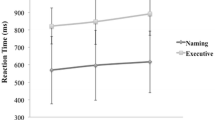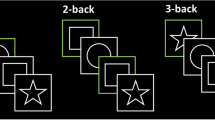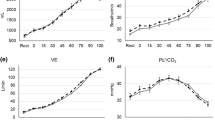Abstract
Purpose
Findings concerning the effects of exhaustive exercise on cognitive function are somewhat equivocal. The purpose of this study was to identify physiological factors that determine executive function after exhaustive exercise.
Methods
Thirty-two participants completed the cognitive tasks before and after an incremental exercise until exhaustion (exercise group: N = 18) or resting period (control group N = 14). The cognitive task was a combination of a Spatial Delayed-Response (Spatial DR) task and a Go/No-Go task, which requires executive function. Cerebral oxygenation and skin blood flow were monitored during the cognitive task over the prefrontal cortex. Venous blood samples were collected before and after the exercise or resting period, and blood catecholamines, serum brain-derived neurotrophic factor, insulin-like growth hormone factor 1, and blood lactate concentrations were analyzed.
Results
In the exercise group, exhaustive exercise did not alter reaction time (RT) in the Go/No-Go task (pre: 861 ± 299 ms vs. post: 775 ± 168 ms) and the number of error trials in the Go/No-Go task (pre: 0.9 ± 0.7 vs. post: 1.8 ± 1.8) and the Spatial DR task (pre: 0.3 ± 0.5 vs. post: 0.8 ± 1.2). However, ΔRT was negatively correlated with Δcerebral oxygenation (r = −0.64, P = 0.004). Other physiological parameters were not correlated with cognitive performance. Venous blood samples were not directly associated with cognitive function after exhaustive exercise.
Conclusion
The present results suggest that recovery of regional cerebral oxygenation affects executive function after exhaustive exercise.




Similar content being viewed by others
Abbreviations
- BDNF:
-
Brain-derived neurotrophic factor
- DBP:
-
Diastolic blood pressure
- Deoxy-Hb:
-
Deoxyhemoglobin
- DR:
-
Delayed-response
- IGF-1:
-
Insulin-like growth hormone factor 1
- NIRS:
-
Near-infrared spectroscopy
- NTS:
-
Nucleus tractus solitarii
- Oxy-Hb:
-
Oxyhemoglobin
- RPE:
-
Ratings of perceived exertion
- RT:
-
Reaction time
- SBP:
-
Systolic blood pressure
- SD:
-
Standard deviation
- Total-Hb:
-
Total hemoglobin
References
Ando S, Yamada Y, Kokubu M (2010) Reaction time to peripheral visual stimuli during exercise under hypoxia. J Appl Physiol 108(5):1210–1216. doi:10.1152/japplphysiol.01115.2009
Ando S, Kokubu M, Yamada Y, Kimura M (2011) Does cerebral oxygenation affect cognitive function during exercise? Eur J Appl Physiol 111(9):1973–1982. doi:10.1007/s00421-011-1827-1
Ando S, Hatamoto Y, Sudo M, Kiyonaga A, Tanaka H, Higaki Y (2013) The effects of exercise under hypoxia on cognitive function. PLoS One 8(5):e63630. doi:10.1371/journal.pone.0063630
Bertollo M, di Fronso S, Filho E, Lamberti V, Ripari P, Machado Reis V, Comani S, Bortoli L, Robazza C (2015) To focus or not to focus: is attention on the core components of action beneficial for cycling performance? Sport Psychol 29(2):110–119
Borg G (ed) (1975) Simple rating for estimation of perceived exertion. Physical work and effort. Pergamon, New York
Borst SE, De Hoyos DV, Garzarella L, Vincent K, Pollock BH, Lowenthal DT, Pollock ML (2001) Effects of resistance training on insulin-like growth factor-I and IGF binding proteins. Med Sci Sports Exerc 33(4):648–653
Boushel R, Langberg H, Olesen J, Gonzales-Alonzo J, Bulow J, Kjaer M (2001) Monitoring tissue oxygen availability with near infrared spectroscopy (NIRS) in health and disease. Scand J Med Sci Sports 11(4):213–222
Brisswalter J, Collardeau M, Rene A (2002) Effects of acute physical exercise characteristics on cognitive performance. Sports Med 32(9):555–566
Cassilhas RC, Viana VA, Grassmann V, Santos RT, Santos RF, Tufik S, Mello MT (2007) The impact of resistance exercise on the cognitive function of the elderly. Med Sci Sports Exerc 39(8):1401–1407. doi:10.1249/mss.0b013e318060111f
Cassilhas RC, Lee KS, Fernandes J, Oliveira MG, Tufik S, Meeusen R, de Mello MT (2012) Spatial memory is improved by aerobic and resistance exercise through divergent molecular mechanisms. Neuroscience 202:309–317. doi:10.1016/j.neuroscience.2011.11.029
Chang YK, Labban JD, Gapin JI, Etnier JL (2012) The effects of acute exercise on cognitive performance: a meta-analysis. Brain Res 1453:87–101. doi:10.1016/j.brainres.2012.02.068
Chmura J, Nazar K, Kaciuba-Uscilko H (1994) Choice reaction time during graded exercise in relation to blood lactate and plasma catecholamine thresholds. Int J Sports Med 15(4):172–176. doi:10.1055/s-2007-1021042
Cooper CJ (1973) Anatomical and physiological mechanisms of arousal, with special reference to the effects of exercise. Ergonomics 16(5):601–609. doi:10.1080/00140137308924551
Cornford EM, Braun LD, Oldendorf WH, Hill MA (1982) Comparison of lipid-mediated blood–brain-barrier penetrability in neonates and adults. Am J Physiol 243(3):C161–C168
Cotman CW, Berchtold NC (2002) Exercise: a behavioral intervention to enhance brain health and plasticity. Trends Neurosci 25(6):295–301
Dietrich A, Audiffren M (2011) The reticular-activating hypofrontality (RAH) model of acute exercise. Neurosci Biobehav Rev 35(6):1305–1325. doi:10.1016/j.neubiorev.2011.02.001
Ding Q, Vaynman S, Akhavan M, Ying Z, Gomez-Pinilla F (2006) Insulin-like growth factor I interfaces with brain-derived neurotrophic factor-mediated synaptic plasticity to modulate aspects of exercise-induced cognitive function. Neuroscience 140(3):823–833. doi:10.1016/j.neuroscience.2006.02.084
Ekkekakis P, Vazou S, Bixby WR, Georgiadis E (2016) The mysterious case of the public health guideline that is (almost) entirely ignored: call for a research agenda on the causes of the extreme avoidance of physical activity in obesity. Obes Rev 17(4):313–329. doi:10.1111/obr.12369
Glickman ME, Rao SR, Schultz MR (2014) False discovery rate control is a recommended alternative to Bonferroni-type adjustments in health studies. J Clin Epidemiol 67(8):850–857. doi:10.1016/j.jclinepi.2014.03.012
Gonzalez-Alonso J, Dalsgaard MK, Osada T, Volianitis S, Dawson EA, Yoshiga CC, Secher NH (2004) Brain and central haemodynamics and oxygenation during maximal exercise in humans. J Physiol 557(Pt 1):331–342. doi:10.1113/jphysiol.2004.060574
Harada T, Okagawa S, Kubota K (2004) Jogging improved performance of a behavioral branching task: implications for prefrontal activation. Neurosci Res 49(3):325–337. doi:10.1016/j.neures.2004.03.011
Ide K, Secher NH (2000) Cerebral blood flow and metabolism during exercise. Prog Neurobiol 61(4):397–414
Komiyama T, Sudo M, Higaki Y, Kiyonaga A, Tanaka H, Ando S (2015) Does moderate hypoxia alter working memory and executive function during prolonged exercise? Physiol Behav 139:290–296. doi:10.1016/j.physbeh.2014.11.057
Lambourne K, Tomporowski P (2010) The effect of exercise-induced arousal on cognitive task performance: a meta-regression analysis. Brain Res 1341:12–24. doi:10.1016/j.brainres.2010.03.091
Lee JK, Koh AC, Koh SX, Liu GJ, Nio AQ, Fan PW (2014) Neck cooling and cognitive performance following exercise-induced hyperthermia. Eur J Appl Physiol 114(2):375–384. doi:10.1007/s00421-013-2774-9
McGaugh JL, Cahill L, Roozendaal B (1996) Involvement of the amygdala in memory storage: interaction with other brain systems. Proc Natl Acad Sci USA 93(24):13508–13514
McMorris T (2016a) Beyond the catecholamine hypothesis for an acute exercise–cognition interaction: a neurochemical perspective. In: McMorris T (ed) Exercise–cognition interaction: neuroscience perspective. Elsevier, Amsterdam, pp 65–103
McMorris T (2016b) Developing the catecholamines hypothesis for the acute exercise-cognition interaction in humans: lessons from animal studies. Physiol Behav 165:291–299. doi:10.1016/j.physbeh.2016.08.011
Meeusen R, De Meirleir K (1995) Exercise and brain neurotransmission. Sports Med 20(3):160–188
Mekari S, Fraser S, Bosquet L, Bonnery C, Labelle V, Pouliot P, Lesage F, Bherer L (2015) The relationship between exercise intensity, cerebral oxygenation and cognitive performance in young adults. Eur J Appl Physiol 115(10):2189–2197. doi:10.1007/s00421-015-3199-4
Miyashita T, Williams CL (2006) Epinephrine administration increases neural impulses propagated along the vagus nerve: role of peripheral beta-adrenergic receptors. Neurobiol Learn Mem 85(2):116–124. doi:10.1016/j.nlm.2005.08.013
Nishijima T, Torres-Aleman I, Soya H (2016) Exercise and cerebrovascular plasticity. Prog Brain Res 225:243–268. doi:10.1016/bs.pbr.2016.03.010
Nybo L, Secher NH (2004) Cerebral perturbations provoked by prolonged exercise. Prog Neurobiol 72(4):223–261. doi:10.1016/j.pneurobio.2004.03.005
Ogoh S, Ainslie PN (2009) Cerebral blood flow during exercise: mechanisms of regulation. J Appl Physiol 107(5):1370–1380. doi:10.1152/japplphysiol.00573.2009
Piepmeier AT, Etnier JL (2015) Brain-derived neurotrophic factor (BDNF) as a potential mechanism of the effects of acute exercise on cognitive performance. J Sport Health Sci 4(1):14–23. doi:10.1016/j.jshs.2014.11.001
Quistorff B, Secher NH, Van Lieshout JJ (2008) Lactate fuels the human brain during exercise. FASEB J 22(10):3443–3449. doi:10.1096/fj.08-106104
Raichle M, Hornbein T (2001) The high-altitude brain. In: Hornbein T, Schoene R (eds) High altitude: an exploration of human adaptation. Marcel Dekker, New York, pp 377–423
Ramsay DS, Woods SC (2014) Clarifying the roles of homeostasis and allostasis in physiological regulation. Psychol Rev 121(2):225–247. doi:10.1037/a0035942
Rooks CR, Thom NJ, McCully KK, Dishman RK (2010) Effects of incremental exercise on cerebral oxygenation measured by near-infrared spectroscopy: a systematic review. Prog Neurobiol 92(2):134–150. doi:10.1016/j.pneurobio.2010.06.002
Schmit C, Davranche K, Easthope CS, Colson SS, Brisswalter J, Radel R (2015) Pushing to the limits: the dynamics of cognitive control during exhausting exercise. Neuropsychologia 68:71–81. doi:10.1016/j.neuropsychologia.2015.01.006
Sorensen H, Secher NH, Siebenmann C, Nielsen HB, Kohl-Bareis M, Lundby C, Rasmussen P (2012) Cutaneous vasoconstriction affects near-infrared spectroscopy determined cerebral oxygen saturation during administration of norepinephrine. Anesthesiology 117(2):263–270. doi:10.1097/ALN.0b013e3182605afe
Takahashi T, Takikawa Y, Kawagoe R, Shibuya S, Iwano T, Kitazawa S (2011) Influence of skin blood flow on near-infrared spectroscopy signals measured on the forehead during a verbal fluency task. Neuroimage 57(3):991–1002. doi:10.1016/j.neuroimage.2011.05.012
Tobias JD, Johnson GA, Rehman S, Fisher R, Caron N (2008) Cerebral oxygenation monitoring using near infrared spectroscopy during one-lung ventilation in adults. J Minim Access Surg 4(4):104–107
Tsai CL, Wang CH, Pan CY, Chen FC, Huang TH, Chou FY (2014) Executive function and endocrinological responses to acute resistance exercise. Front Behav Neurosci 8:262. doi:10.3389/fnbeh.2014.00262
Tsukamoto H, Suga T, Takenaka S, Tanaka D, Takeuchi T, Hamaoka T, Isaka T, Ogoh S, Hashimoto T (2016) Repeated high-intensity interval exercise shortens the positive effect on executive function during post-exercise recovery in healthy young males. Physiol Behav 160:26–34. doi:10.1016/j.physbeh.2016.03.029
van Hall G (2010) Lactate kinetics in human tissues at rest and during exercise. Acta Physiol (Oxf) 199(4):499–508. doi:10.1111/j.1748-1716.2010.02122.x
Voss MW, Vivar C, Kramer AF, van Praag H (2013) Bridging animal and human models of exercise-induced brain plasticity. Trends Cogn Sci 17(10):525–544. doi:10.1016/j.tics.2013.08.001
Winter B, Breitenstein C, Mooren FC, Voelker K, Fobker M, Lechtermann A, Krueger K, Fromme A, Korsukewitz C, Floel A, Knecht S (2007) High impact running improves learning. Neurobiol Learn Mem 87(4):597–609. doi:10.1016/j.nlm.2006.11.003
Yucel MA, Aasted CM, Petkov MP, Borsook D, Boas DA, Becerra L (2015) Specificity of hemodynamic brain responses to painful stimuli: a functional near-infrared spectroscopy study. Sci Rep 5:9469. doi:10.1038/srep09469
Acknowledgements
We are grateful to Dr. Kisou Kubota for providing software to evaluate cognitive function.
Author information
Authors and Affiliations
Corresponding author
Ethics declarations
Funding
This study was funded by the Japan Society for the Promotion of Science KAKENHI (Grant Number: 25702039).
Conflict of interest
The authors declare that they have no conflict of interest.
Ethical approval
All procedures performed in studies involving human participants were in accordance with the ethical standards of the institutional and/or national research committee and with the 1964 Helsinki declaration and its later amendments or comparable ethical standards.
Additional information
Communicated by Westerterp/Westerblad.
Rights and permissions
About this article
Cite this article
Sudo, M., Komiyama, T., Aoyagi, R. et al. Executive function after exhaustive exercise. Eur J Appl Physiol 117, 2029–2038 (2017). https://doi.org/10.1007/s00421-017-3692-z
Received:
Accepted:
Published:
Issue Date:
DOI: https://doi.org/10.1007/s00421-017-3692-z




